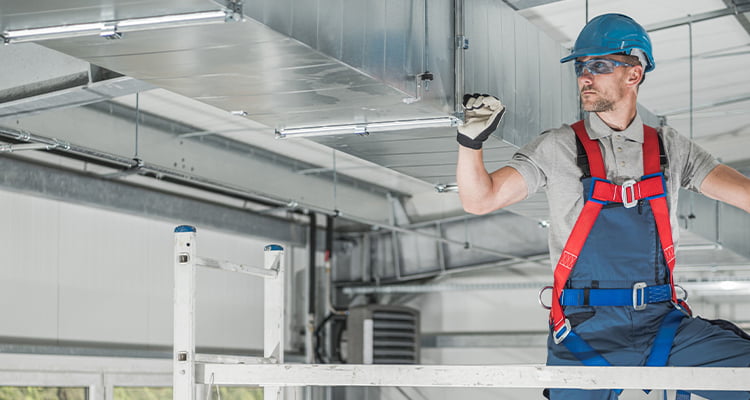
Heating, ventilation, and air conditioning (HVAC) systems are crucial in maintaining comfort in any residential space, including condominiums. This guide aims to demystify the specifics of HVAC systems in condos, offering a clear understanding of how they function, the types available, and tips for their maintenance.
Whether you’re a condo owner, a prospective buyer, or simply curious, this comprehensive breakdown will equip you with essential knowledge.
What Is A Condo HVAC System?
A condo HVAC system regulates the temperature, airflow, and humidity within a condominium unit. Unlike standalone houses, condos are part of larger buildings where heating and cooling solutions often need to accommodate shared spaces and individual units.
Thus, the systems can vary significantly from those in single-family homes.
Types Of HVAC Systems in Condos
1. Central Systems
Many modern condos feature central HVAC systems. These systems use a network of ducts to distribute air throughout the building. Typically managed by the building’s management, central systems ensure a consistent climate in all units.
However, the downside is less control over individual temperature settings.
2. Individual Systems
Alternatively, some condos have individual HVAC systems for each unit. These might be standalone air conditioners and heaters or more complex setups like split systems, which include an outdoor compressor and an indoor air handling unit.
This type gives owners more control over their environment.
3. Hybrid Systems
Hybrid systems combine elements of both central and individual systems. For example, a building might have a central boiler for heating but allow individual air conditioning units for cooling. This setup offers a balance between uniformity and personalization.
Components Of Condo HVAC Systems
Understanding the components can help in managing and troubleshooting the system more effectively.
1. Thermostat
The thermostat acts as the control center, allowing residents to set their preferred temperatures. In centrally controlled setups, the thermostat might have limitations to ensure uniformity across the building.
2. Air Handler
This component circulates air throughout the condo. In central systems, a large air handler pushes air through ducts to each unit. In individual systems, a smaller, unit-specific handler circulates air within that space alone.
3. Heat Source
The heat source can vary. Common solutions include furnaces, which may run on gas, electricity, or oil, and heat pumps, which extract heat from external air or ground sources to warm the indoor space.
4. Cooling Components
For cooling, condos might use traditional air conditioners or heat pumps. These systems remove heat from the indoor air and expel it outside, lowering the indoor temperature.
Installation Considerations
Installing an HVAC system in a condo involves several considerations that differ from those in a single-family home. Space constraints often require solutions like rooftop units or systems designed to fit within limited closet spaces.
Additionally, the installation must comply with the building’s structural guidelines and legal regulations. Such rules and considerations are the reasons why you should always rely on experienced HVAC technicians to install HVAC systems in your condo.
Maintenance Tips
Regular maintenance is essential to keep your HVAC system running efficiently. Here are some tips:
1. Regular Filter Changes
Changing the air filter every 30 to 90 days, depending on usage, can significantly improve air quality and system efficiency.
2. Annual Inspections
Have a professional inspect and service your HVAC system at least once a year. This checkup can help catch issues before they turn into costly problems.
3. Clear Vents
Ensure that all air vents are clear of obstructions like furniture or curtains to maintain proper airflow.
4. Thermostat Settings
Optimize your thermostat settings for efficiency. For example, setting a programmable thermostat to lower the temperature during times when you’re away can reduce energy consumption.
5. Address Repairs Promptly
If you notice something off with your HVAC system, such as strange noises or a drop in heating or cooling effectiveness, address it promptly. Delaying repairs can lead to more severe damage and higher repair costs.
Overall, understanding the intricacies of your condo’s HVAC system enhances not only your comfort but also your unit’s efficiency and value. Whether dealing with a central, individual, or hybrid system, knowledge is power.
By keeping informed about your system’s type, components, and maintenance needs, you can ensure a comfortable and energy-efficient home environment.
How Can We Help?
At Pro West Heating & Air Conditioning, we understand the unique challenges of condo living, especially when it comes to maintaining a comfortable climate. That’s why we specialize in servicing and maintaining condo HVAC systems.
Our expert technicians are familiar with all types of condo HVAC systems and can help you achieve optimal performance and efficiency in your unit. We prioritize customer satisfaction and are committed to providing exceptional service to ensure your condo remains a comfortable haven year-round.
Contact us today to schedule an appointment or learn more about how we can keep your condo’s HVAC system running smoothly.